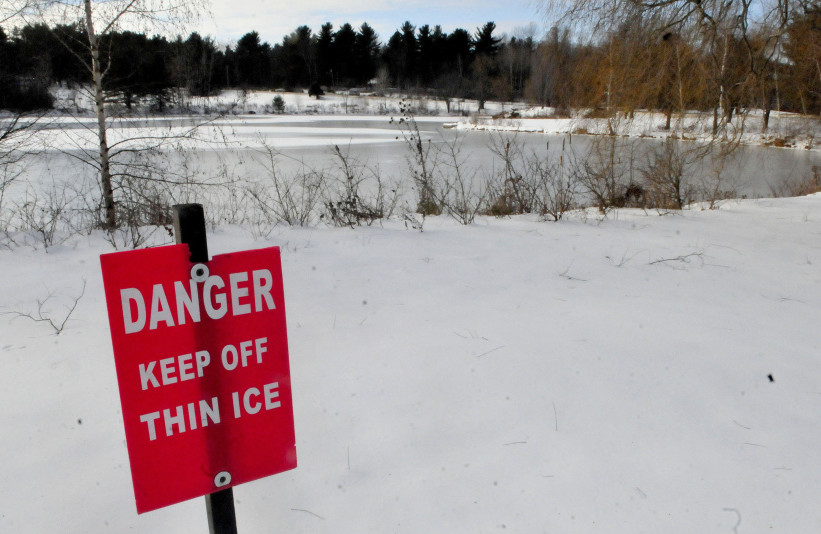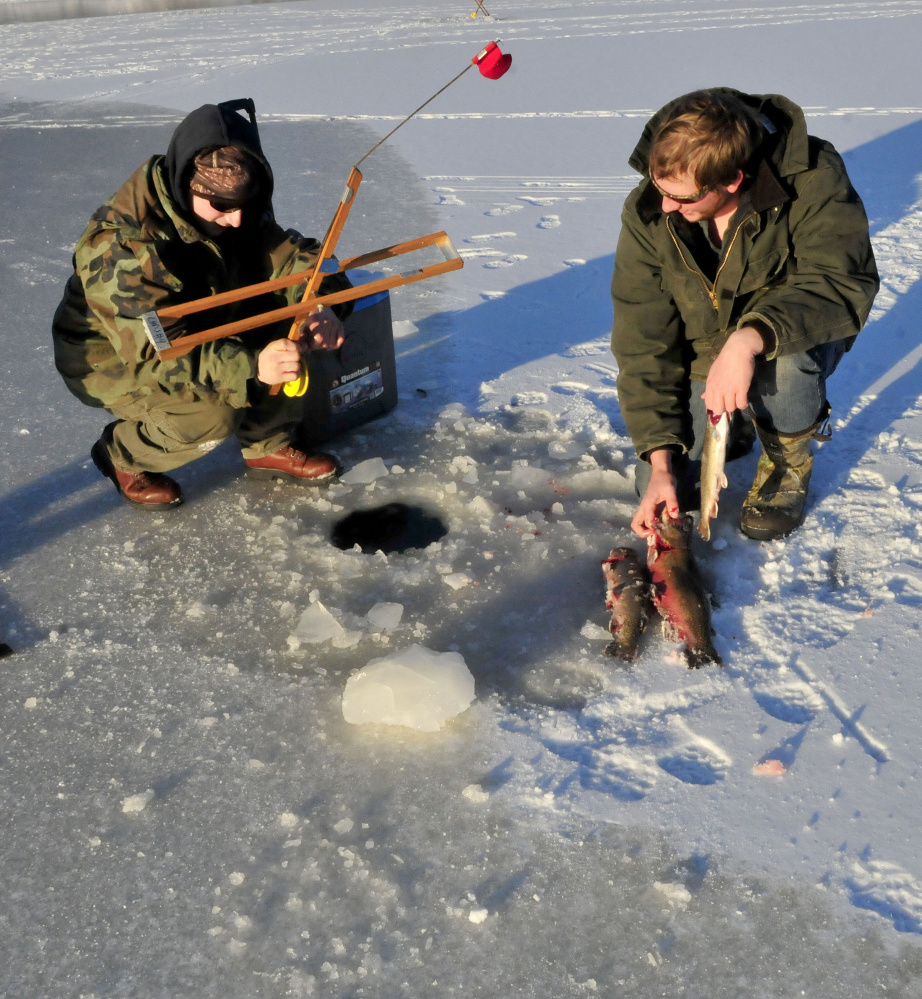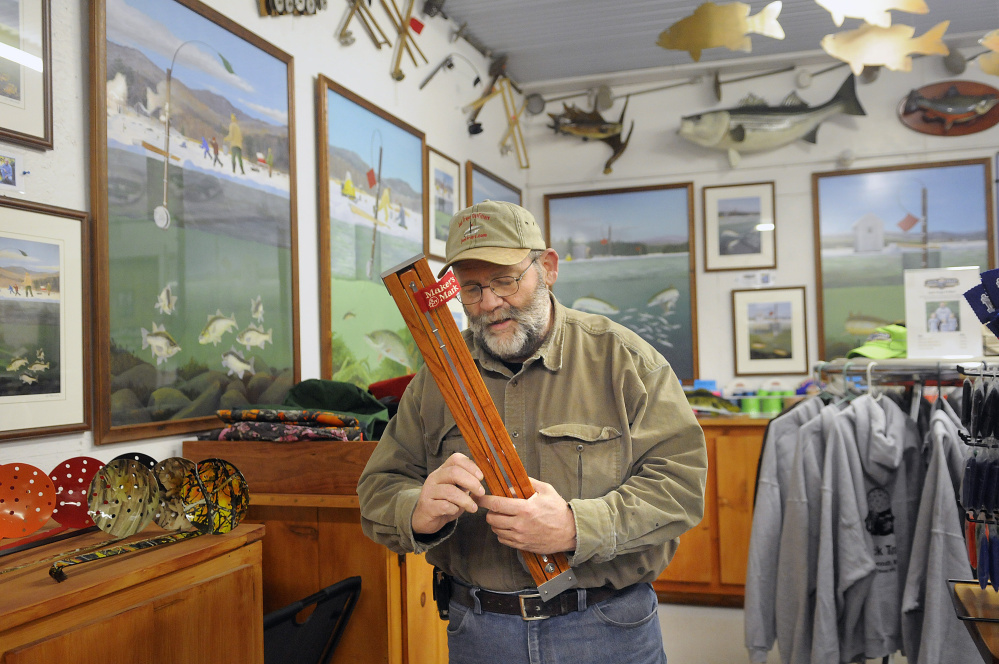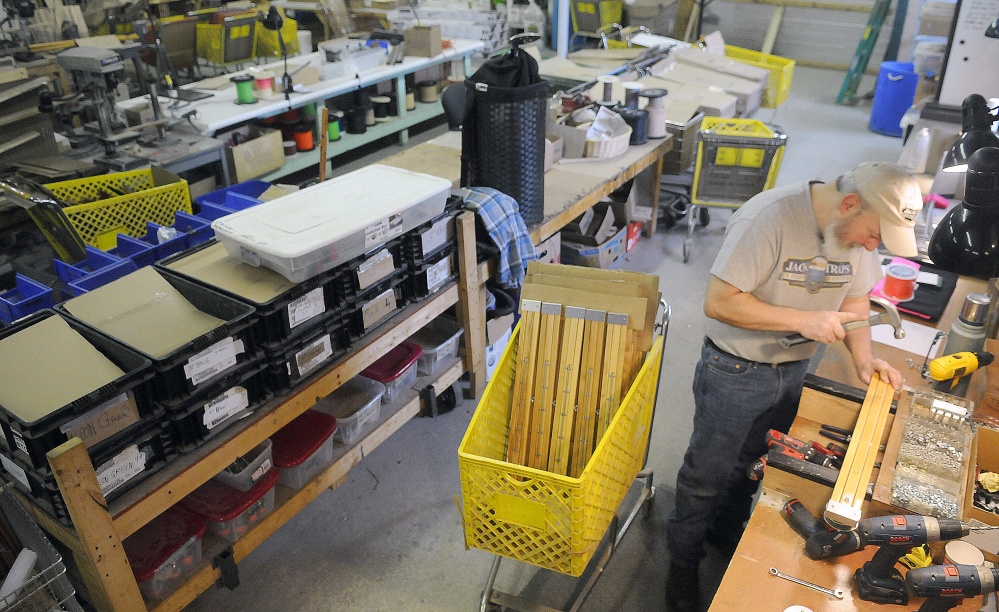There’s almost a foot of snow on the ground and daytime temperatures struggle to get above freezing, but many water bodies are still open and unfrozen in central Maine, leaving some to wonder when conditions will be safe enough to go out on the lakes.
Incoming water, depth and area of a water body are factors determining when a water body will freeze over, so there is no firm date to expect ice-in, but business owners who rely on frozen lakes and ponds, as well as anglers who like to spend frigid afternoons on the ice, say the freeze is about a month late.
Public safety officials are urging extreme caution for those venturing out on ice.
“It’s so varied. Every body of water is so different,” said Maine Warden Service spokesman Cpl. John MacDonald. “We never say, ‘It’s safe, go ahead.'”
The unseasonably warm conditions through December have hindered ice formation across the state. Last week, the superintendent of the Allagash Wilderness Waterway in northern Maine in a news release warned people to be safe on the waterway because of thin ice.
The warden service has helped rescue several people who went through the ice attempting to rescue animals, but hasn’t had to pull any snowmobilers or people ice fishing yet, MacDonald said.
Below zero overnight temperatures are expected this week in parts of the state, which should help firm up some ice, but people still need to use caution.
“We always have to tell people to check for themselves,” MacDonald said.
The general recommendation is for at least 4 inches of clear solid ice to walk on and at least 5 inches for snowmobiles and ATVs.
The state Bureau of General Services points out it’s illegal in some places to drive a car or truck on the ice and never recommended. If it’s necessary, there should be at least 8 inches to a foot of clear, solid ice.
According to the Auburn-based Maine Volunteer Lake Monitoring Program, 25 lakes reported ice-in last year, most before Jan. 1. This year, only seven have reported ice-in, all in the last week or so.
Maine’s deep freeze is one of the reasons its lakes and ponds are so clean, compared to warmer states, said Scott Williams, the program’s executive director.
Ice coverage plays a significant role in a lake’s annual cycle. Late ice formation and early melt could lead to faster algae growth and have profound consequences for future water quality and clarity, he said.
“What we do know is our lakes are probably not going to be the same in the future if the climate is warming, which it is,” Williams said.
Ice-in is considered four inches of ice, according to the program’s website.
“Ice-in occurs when the lake is completely or nearly completely covered with ice,” according to the program’s website. “However, lakes can thaw after an early ice-in and remain open for weeks until the ice finally closes in for the winter.”
‘LATEST I CAN REMEMBER’
On Monday afternoon, a handful of fishermen laid traps on the ice close to the shore on the northern end of McGrath Pond in Oakland.
Quinn Warren, 20, and Tyler Pellerin, 20, both of Oakland, were checking traps near a red and black nylon shelter they’d set up on the ice to help shield them from Monday’s frigid wind. They were on the ice about a month later than usual and were sticking close to the shore because the ice wasn’t thick enough farther out.
“It’s the latest I can remember” the lake freezing over, Pellerin said.
They usually prefer to fish on Messalonskee Lake, but that still has open water, and they’ll wait for the ice to be at least eight inches thick before setting out an ice shack, Warren said.
Although conditions weren’t perfect, the pair still had some luck and caught a couple brook trout. Warren guessed that cold weather forecast for the next few days will bring more people out.
“This weekend this place will be packed,” he said.
Snowmobilers from southern New England are anxious to come up to Maine, but need to be very careful, said Bob Meyers, the executive director of the Maine Snowmobile Association.
“It’s a really treacherous situation, and sadly it doesn’t look like it’s going to improve for a while,” Meyer said.
“It’s safe to say there is no water in the state that is safe right now, so people should approach it with extreme caution,” he added.
In Jackman, the lakes are usually frozen by late December, but this year there is still open water in some places.
Debbie Petrin, who runs the Long Pond Camps and Guide Service, said they had scheduled a snowmobile race on the pond this upcoming weekend, but had to move the venue to the Border Riders Snowmobile Club in Jackman because the ice wasn’t thick enough. Petrin, who has lived in Jackman with her husband, Randy, for the last 27 years, said this is the latest ice-in they can remember.
Tami Cowen, who owns Cozy Cove Cabins on nearby Woods Pond, watched game wardens and local emergency workers rescue two deer that broke through the ice on New Year’s Day and posted about the rescue on the cabins Facebook page.
“We’re always frozen by the first, always,” she said in an interview.
Some of her winter customers come to go fishing, and Cowen hopes the late ice-in won’t affect reservations.
“Winter sports are really important up here,” Cowen said. “I’m being optimistic that it’s going to be safe enough to go ice fishing soon.”
SMELTING IN JEOPARDY
Parts of the northern Kennebec River are starting to freeze over, but farther south, in the smelting areas south of Gardiner, ice hasn’t formed yet.
Sharon James, whose family runs the James’ Eddy Smelt Camp on the Eastern River in Dresden, said the business usually has 50 shelters on the ice by this time, but haven’t put out any this winter.
“The coves in the river have some shell ice, but out where we put the camps there is nothing,” James said.
The warm weather and fierce tides on the river make her concerned that the camps might not go out at all. There has to be four or five below-zero nights in a row to set the ice, but the forecast doesn’t look that way, she said.
“It could be a week, it could be two weeks, it could be not at all,” James said.
Late ice has also put a pinch on business for ice fishing retailers and bait shops, said Timothy Jackson, the owner of Jack Traps, a Monmouth-based ice fishing equipment manufacturer and retailer.
Without ice on the lakes, the season got off to a slow start and he missed out on some holiday business, but Jackson was confident that things would get back to normal soon.
The late ice happens every eight years or so, he estimated. This year’s warm temperatures could be a result of El Nino and warming climate, “but in another two weeks, everyone will have forgotten about it,” Jackson said.
He had three people come in to buy bait Monday morning and said fishermen who know their way around the ice will have traps out this week.
In Weld, the town is leaning toward postponing or canceling a Jan. 16 ice fishing derby on Webb Lake, the first event in its year-long biennial celebration, said organizer Sean Minear.
“There is still open water on the middle of Webb Lake. We are just concerned about the safety of people participating,” Minear said. The town might reschedule the derby for sometime in February, he added.
Minear couldn’t help draw a comparison between this year’s unseasonable warmth and 1816, the year Weld was incorporated, but also a year when abnormally cold weather brought a hard frost every month and caused crop failures and emigration from New England. The year is sometimes referred to as “eighteen hundred and froze to death,” according to the New England Historical Society.
“As the town of Weld is celebrating its bicentennial, now we can’t get people into Weld because it is so warm,” Minear said.
Peter McGuire — 861-9239
Send questions/comments to the editors.







Success. Please wait for the page to reload. If the page does not reload within 5 seconds, please refresh the page.
Enter your email and password to access comments.
Hi, to comment on stories you must . This profile is in addition to your subscription and website login.
Already have a commenting profile? .
Invalid username/password.
Please check your email to confirm and complete your registration.
Only subscribers are eligible to post comments. Please subscribe or login first for digital access. Here’s why.
Use the form below to reset your password. When you've submitted your account email, we will send an email with a reset code.